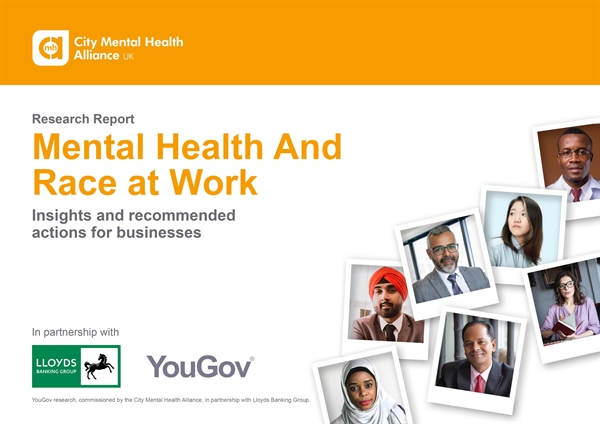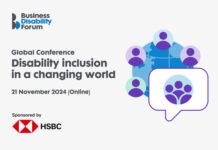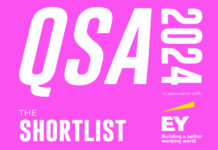A new report published by the UK’s City Mental Health Alliance (CMHA), in partnership with Lloyds Banking Group, has revealed how workplace racism and a lack of inclusion negatively impacts staff mental health and wellbeing.
Around half of Black employees (45%) have experienced racism at work in the UK; along with 26% East Asian, 23% South Asia and 24% of Mixed Race workers, according to the study published today. Over half (56%) of those employees who have suffered racism at work said it had negatively impacted their mental health and wellbeing, according to the Mental Health and Race At Work Research Report.
The report also revealed that around half of South Asian (46%), East Asian (45%) and Black employees (43%) reported that they felt like they needed to change aspects of their behaviour to fit in at work; compared to only a quarter (27%) of White British people. When asked how this made them feel, respondents said “isolated”, “anxious”, “frustrated” and “sad”. In addition, around half of Black (52%), East Asian (49%), South Asian (49%) who have experienced poor mental health over the last 12 months said that not fitting in at work had been a significant factor.
COVID-19 IMPACT ON WELLBEING
Nearly two thirds of all employees (60%), across all ethnicities, reported that the global pandemic has had a negative impact on their mental health and wellbeing, noted the report. Living through the pandemic has also made it more likely that people who are Black or from a minority ethnic background have experienced racism; or other difficult events that have hurt their mental health. Around one in six (14%) of Black and South Asian respondents said that they had a traumatic personal or family experience because of Covid-19; compared to 6% of White British people. Since the start of the pandemic, 18% of South Asian and 14% of Black people experienced a bereavement; compared to 9% of White British people.

There are signs, however, that accessing mental health and wellbeing support at work is improving. Encouragingly 74% White British, 76% Mixed Race, 69% Black, 66% South Asian and 58% of East Asian people say they feel they can talk openly about mental health in the workplace. That said, only 60% of Black, 49% of South Asian, 35% East Asian and 30% Mixed race employees said they would be more comfortable accessing mental health support, if those providing support came from more diverse backgrounds; and if the support was promoted in a more diverse way.
CREATING MENTALLY HEALTHY WORKPLACES
“It’s clear that when it comes to mental health and race at work, businesses can affect their employees in one of two main ways. They can provide an inclusive environment, that is anti-racist, creates a sense of belonging and which offers appropriate and representative mental health support to those employees who might need it, so that all of their people can thrive. Or, they can be a source of stress and contribute to poor mental health because of discriminatory practices and a non-inclusive culture, which is clearly unacceptable,” stated Poppy Jaman, CEO at CMHA.
Businesses have a “responsibility and an opportunity to build not only diverse, but also inclusive and mentally healthy workplaces”, highlighted Jaman. “I have seen an outpouring of commitment to action from business on the mental health and the inclusion agenda over the last year, so the momentum is there. The CMHA and Lloyds Banking Group is sharing this Mental Health and Race Research Report in the hope that these insights and recommendations for good practice will inform and guide businesses on how to build psychologically safe workplaces for all their people. Let’s seize the opportunity to create change for good.”

CREATING ANTI-RACIST INCLUSIVE WORKPLACES
Adding to her comments Fiona Cannon, Director Sustainable Business for Lloyds Banking Group said: “By partnering with the City Mental Health Alliance, we hope this research, and the personal perspectives shared, help to inform businesses on this issue and inspire action to help create an anti-racist, inclusive working environment for everyone.”
At Lloyds Banking Group, “the mental health and wellbeing of our people is a key priority”, confirmed Cannon. “As a result of the research findings, we are looking at what new initiatives we need to put in place to provide more tailored support for our Black, Asian and Minority Ethnic colleagues. We’re continuing to develop our Race Action Plan to help respond to these challenges. This research is an important part of our commitment to continue to listen, learn and work with experts in the field of mental health, in particular as we seek to create a fully inclusive workplace where everyone can thrive.”
KEY RECOMMENDATIONS
The report recommends five strategic actions to guide businesses to build workplaces that will protect, support and create positive mental health for their people; especially those who are Black or from a minority ethnic background. They include:
- Recognise the specific challenges that employees from Black and Minority Ethnic groups are facing.
- Be actively anti-racist and prioritise inclusion.
- Promote and design inclusive workplace health and wellbeing systems.
- Allocate Board level responsibility for mental health and inclusion.
- Measure and be transparent about progress.
Click here to read the full report. A recent UK report identified the “gross failings” of businesses to collectively address and act upon racial disparity in the workplace. Click here to read more.





































